Celebrating 35 years: defying boundaries, redefining possibilities
A publication of the International Myeloma Foundation
Celebrating 35 Years: Defying Boundaries, Redefining Possibilities

Celebrating 35 years: defying boundaries, redefining possibilities
A publication of the International Myeloma Foundation
Celebrating 35 Years: Defying Boundaries, Redefining Possibilities
The IMF reaches 50+ million people in 52 countries
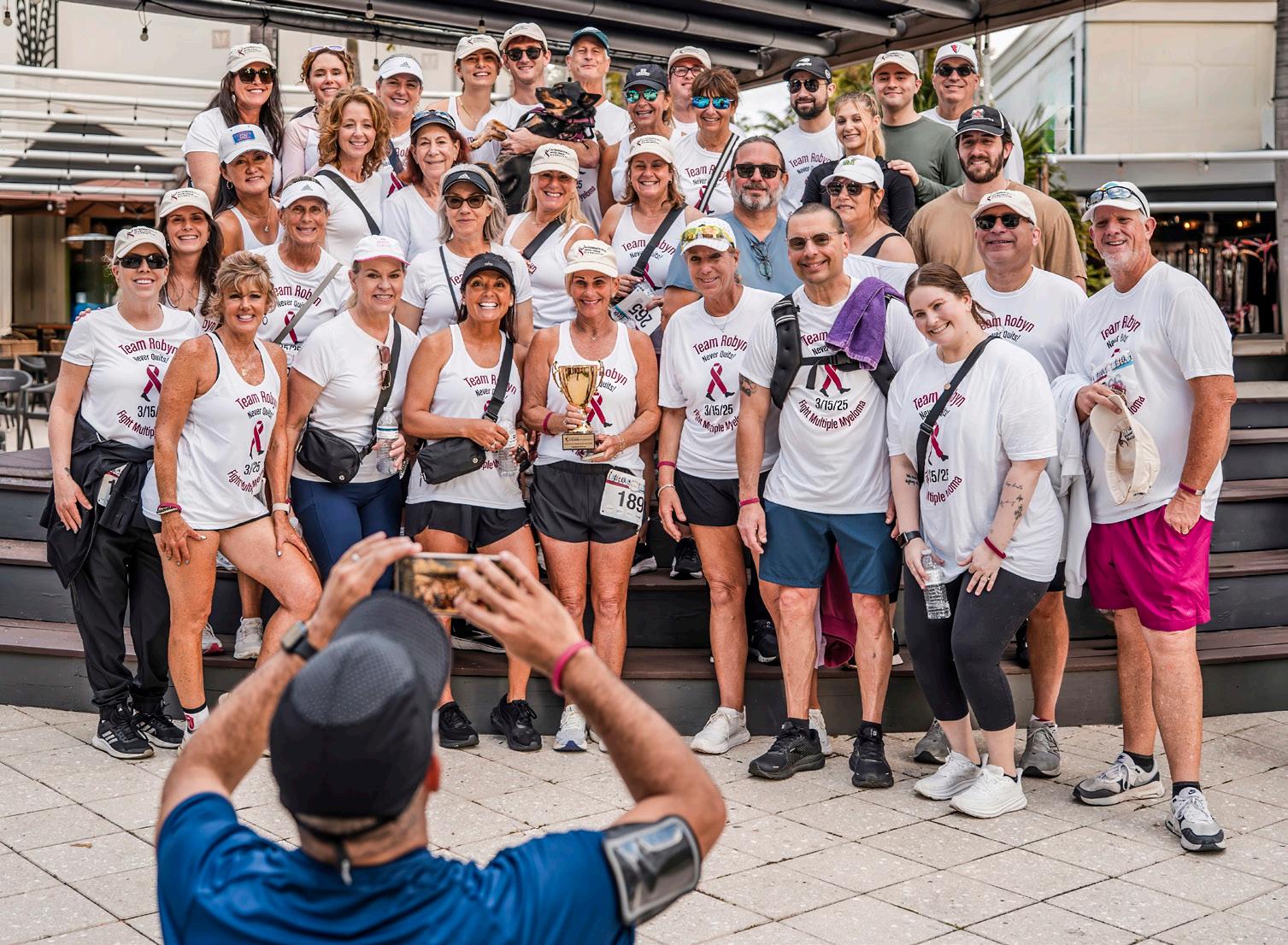

The IMF’s actions included launching the Miracles for Myeloma 5K Run/Walk, presenting the first IMF Patient & Family Seminar of the year, and working with U.S. lawmakers to advance the IMF mission and vision

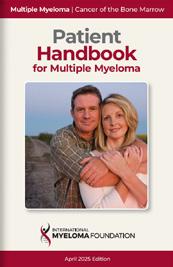








The IMF Patient Handbook for Multiple Myeloma is designed to help patients, care partners, and others to better understand this complex disease. This top-line overview of myeloma also directs readers to other IMF resources for a more comprehensive discussion of each topic. In addition, 2025 editions of the following publications can be downloaded or requested in printed format at publications.myeloma.org. All IMF publications are free-of-charge, and more updated editions are coming soon!
Understanding CARVYKTI ®








Understanding DARZALEX® & DARZALEX FASPRO®
Understanding ELREXFIO ®
Understanding EMPLICITI ®
Understanding MGUS and SMM
Understanding Neuropathy in Myeloma
Understanding SARCLISA®
Understanding TALVEY ™
Understanding Treatment of Myeloma Bone Disease
Understanding VELCADE ®
Understanding the VRd Regimen
Understanding Your Test Results
Care Partners Tip Card
Early Diagnosis Tip Card
What is Multiple Myeloma? Tip Card
Your Healthcare Records Tip Card
As part of the #MyelomaMilestone global campaign during Myeloma Action Month, the IMF hosted Facebook LIVE “Ask Me Anything About Myeloma” Q&A events with leading myeloma experts and educators. Click on the QR codes to go to a replay of each recording.

March 6
Dr. Saad Usmani
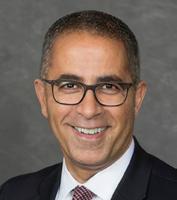
March 15
Dr. Joseph Mikhael

March 25
Dr. Urvi Shah
The IMF Miracles for Myeloma 5K Run/Walk series of events was launched during Myeloma Action Month in Boca Raton, FL. Join us on May 3 (Philadelphia, PA), September 13 (Clark, NJ), or October 4 (Chicago, IL) and be a part of something extraordinary – one step at a time!
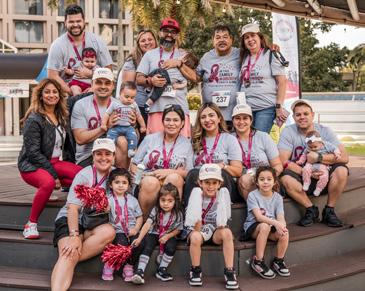
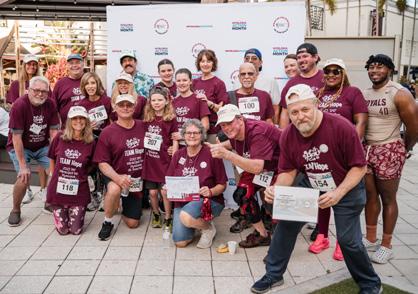


Take advantage of the hyperlinks in Myeloma Today by signing up for the digital edition at subscribe.myeloma.org, where you can also sign up to receive alerts about IMF events, webinars, teleconferences, and advocacy actions, as well as our e-newsletter Myeloma Minute And engage with us on social media! /myeloma @imfmyeloma @imfmyeloma IMFMyeloma imfmyeloma.bsky.social international myeloma foundation
In November 2021, the International Myeloma Foundation (IMF) was pleased to welcome Yelak Biru, a longtime myeloma patient advocate, as our Chief Executive Officer (CEO). Yelak was diagnosed with myeloma in 1995 while a student at the University of North Texas. Upon his diagnosis, he joined a local IMF myeloma support group in Texas, which he later led, then founded and led a new support group in Arkansas. In 2015, Yelak joined the IMF Board of Directors, an organization he once turned to for guidance.

“Living with myeloma is not easy,” said Yelak. “But having an organization like the IMF beside me during my cancer journey has helped me live with – and not for – myeloma. I have directly benefited from advances the IMF led and enabled.” Yelak’s experience as a myeloma patient advocate contributed to his inspirational leadership of the IMF.
In February 2025, Yelak determined that the time was right to pass the torch and allow for new leadership to guide the IMF into its next chapter. He stepped down from his position of dedicated service at the IMF, with his decision being rooted in a desire to embrace new challenges and opportunities after a transformative journey, both professionally and personally.
Yelak has had a major impact on the IMF in all areas, including research, education, patient support, and advocacy. He helped the IMF work on clear priorities that will help myeloma patients worldwide. Under his leadership, the IMF embraced a new vision statement: “A world where every myeloma patient can live life to the fullest, unburdened by the disease.” Yelak continues to be an inspiration.
“It has been an incredible honor to lead the IMF, and to work alongside such a talented and dedicated team,” said Yelak. In turn, the IMF expresses its sincere gratitude for the immense contributions that Yelak has made to this organization, to

patients and care partners, and to the field of myeloma. I have been personally and professionally inspired by Yelak, and I thank him for his dedication and long service to myeloma patients and the IMF.

As the IMF moves forward with its mission and vision, the IMF Board of Directors has chosen Diane Moran (IMF Senior Vice President of Strategic Planning), a highly accomplished healthcare executive who has served the IMF for almost 20 years, to be our Interim CEO during the transition process.

“As we advance the IMF mission and vision, I am privileged to lead our organization forward at this pivotal time of transformation and growth, building on our strong foundation and elevating our mission to improve the quality of life of myeloma patients while working toward prevention and a cure,” says Diane.
The IMF has a clear focus on innovation, and we will continue to defy boundaries and redefine possibilities in myeloma, empowering patients, strengthening partnerships, and fostering collaboration in the myeloma community worldwide.

S. Vincent Rajkumar, MD Chairperson, IMF Board of Directors Editor-in-Chief, Blood Cancer Journal Associate Editor, Mayo Clinic Proceedings Edward W. and Betty Knight Scripps Professor of Medicine Mayo Clinic, Rochester, MN
The next edition of the IMF’s quarterly journal will feature key myeloma news from important annual medical meetings: IMF International Myeloma Working Group (IMWG)
American Society of Clinical Oncology (ASCO)
European Hematology Association (EHA)
By Dr. Joseph Mikhael IMF Chief Medical Officer
When I started my work in myeloma more than 20 years ago, it was truly a terrible disease, and most patients did not live more than one to two years. I went into this field to treat the sickest of the sick. Treatment options were limited and the outlook for most patients was grim. Today, despite the fact that myeloma remains a challenging disease, I wholeheartedly believe in the IMF vision of a future where every myeloma patient can live life to the fullest, unburdened by the disease.
In 2024, the IMF added the “Future of Myeloma” session to our Patient & Family Seminar (PFS) program. At the inaugural session, we asked myeloma expert Dr. Saad Usmani (Memorial Sloan Kettering Cancer Center, New York, NY) to look into his crystal ball and tell us what the future will hold for patients with this disease. This session of our PFS program has evolved into a dialogue between two myeloma specialists.
In March 2025, the first PFS of this year took place during Myeloma Action Month at what has become an annual event in Boca Raton. The seminar was at capacity; it was wonderful to see participants who had joined us time and again in previous years as well as to meet new attendees for whom this was their first experience at an IMF educational event.
For the “Future of Myeloma” session, I invited myeloma expert Dr. Rafat Abonour (Indiana University Simon Comprehensive Cancer Center, Indianapolis, IN) to join me in a dialogue about where the journey of myeloma is headed. I consider myself to be an optimistic realist, so I approach these sessions with both realism of the fight so many have with myeloma, but also with optimism of how far we have come and how far we will go!
When we diagnose myeloma, we want to offer patients a good quality and quantity of life. Over the past decade, remarkable changes in the field have increased patient survival from an average of a couple of years to an expected survival of more than 13 years. Patients have options of exciting new treatment approaches and more intense therapies upfront.
How does the concept of “intercepting cancer” apply to the future of myeloma?
The first question I posed to Dr. Abonour addressed the ability to catch myeloma as early as possible. Early diagnosis is key to preventing complications. It is essential for us to better
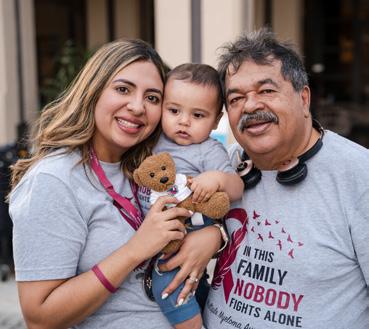
understand why some patients progress from the precursor states of MGUS and SMM to active myeloma while others never develop the disease. We need a deeper understanding of the role of the immune system in this process. The IMF-supported iStopMM researchers in Iceland are trying to answer these and other scientific questions. Science is the path to a cure. It’s not just about the drugs. There is an expanding array of effective drugs being used in myeloma, but we need to better understand the science of myeloma. We can’t develop a drug to attack a myeloma target if we don’t understand the target. The model of cancer I use to explain myeloma to patients is this:
Phase 1 is elimination by our immune system of cells that are trying to become cancerous.
Phase 2 is the equilibrium of the control that the immune system can exert over cancer cells.
Phase 3 is the escape of cancerous cells from being controlled by the immune system, and those cells growing in number.
Dr. Abonour and I concluded that if only we could capture myeloma at its earliest stages, we could have the potential to cure it, if not even prevent it altogether!
years from now,
Screening is usually a test for a person who is asymptomatic. For example, at a certain age you get a colonoscopy or a mammogram. My father sadly died of colon cancer, so I started my colonoscopies earlier due to my family history. In myeloma, primary care physicians diagnose 70% of cases. The average patient sees their doctor three times before the diagnostic pathway is triggered, so the IMF is working to raise awareness at the physician education level.
Dr. Abonour said that screening is not yet the key. Rather, the key is in educating both patients and doctors. Doctors need to know where to look and patients need to be empowered to ask questions about their symptoms. If myeloma is suspected, a doctor can do a needle biopsy to see if plasma cells are present or not. My position is we already know that the rate of myeloma goes up after age 65 and that people of African descent have twice the risk of myeloma. So, although we do not screen everyone for myeloma until we have concrete guidelines, there may be grounds for screening based on specific factors in certain patients.

Dr. Abonour and I concluded that until we have a concrete plan for general screening to facilitate early and accurate diagnosis, it is critical right now to raise awareness of the signs and symptoms of myeloma in the lay and medical communities.
Will frontline therapies 10 years from now still include transplants? Or bispecific antibodies or CAR T-cell therapies?
The myeloma drugs we are using currently are working well in relapsed or refractory multiple myeloma (RRMM), even in patients with high-risk disease. Clinical trials must first test treatment approaches in RRMM patients and only later in newly diagnosed patients, but if a drug is able stimulate the immune cells to destroy myeloma cells in RRMM patients, it’s likely that it’s also going to work well in the newly diagnosed patients.
In the words of Dr. Abonour, “Patients need access to effective drugs in the frontline setting. Why wait until the patient relapses? Truly, we’re close to being able to cure patients!” We agreed that the future of myeloma treatment is in immunotherapies rather than in transplant. Using drugs like bispecific antibodies early and in the right sequence is highly promising. We look forward to data being reported soon from clinical trials using bispecific therapies or using CAR T-cell therapies in the frontline setting.
Over the last two years, we’ve been able to markedly reduce the amount and the severity of cytokine release syndrome (CRS) and the neurological toxicities seen with CAR T-cell therapy, but this approach is still more involved than using a bispecific antibody. First, we must harvest the T cells, wait for them to be modified and multiplied in a lab, then give them back to the patient. Dr. Abonour is a little reluctant about using CAR-T in frontline therapy until we have longer follow-up and know why some patients develop side effects. However, newer CAR T-cell therapies being studied are demonstrating amazing efficacy and improved safety.
Dr. Abonour and I concluded that the future of myeloma has a lot to do with CAR T-cell therapies and bispecific antibodies and their use even earlier in the disease course, as opposed to transplant.
Will a cure of myeloma look like two years of intense therapy, followed by my favorite therapy… NO therapy!? Will a cure look like taking a daily pill for the rest of your life (with no side effects)? Will a cure look like controlling myeloma with medication, like we now
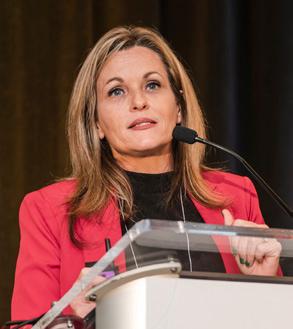
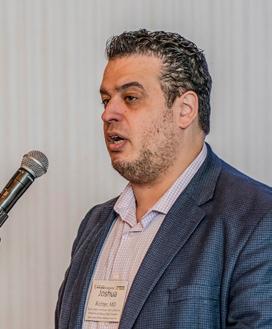
control high blood pressure? Or will a cure be a balance between those things?
The IMF’s mission is to support patients throughout their myeloma journey while we seek prevention and a cure. As an optimistic realist, I’m always careful when I use the word cure. The optimistic part of me says, “We’ve come so far, patients are living longer and better and, as it were, dying of something else like old age.” But I also know the struggle that we have in controlling this disease.
Dr. Abonour thinks that the right answer is balance. “Going to a clinic every week to get a shot or an infusion, to be on pills the rest of your life that may cause fatigue or anemia, is that really a cure? I think a cure is keeping the disease at bay while you live your life to its fullest. And I think we have the tools today to make this happen. We have effective drugs that we can use wisely. Using zoledronic acid once every three months is effective in preventing bone destruction in our patients, and we can use some of the newer anti-myeloma drugs in a similar way. Patients can get a tune-up to try to keep the disease from interfering with their life.
“If we maintain patients in remission for 5 years, whereby sensitive imaging and testing we don’t find myeloma, then we can start taking them off treatment so these patients can live longer without any drugs. This is what gives me hope that we can aim to cure myeloma. We’ve come a long way in the field of myeloma, and we’re getting closer every single day to truly controlling it in such a way that people can consider themselves to be cured.” Beautifully phrased, Dr. Abonour!
Some patients at the Boca Raton PFS have lived with myeloma for more than 20 years, and many are living a good life. One of the goals of IMF meetings is to hear about both the struggles and the successes that patients are experiencing.
IMF seminars also include sessions on controversies in myeloma, therapy for newly diagnosed and relapsed/refractory disease, supportive care and management, the connection between diet and cancer, what causes myeloma, shared decision-making, clinical trials, navigating the financial journey, and more. Each PFS meeting has so much to offer that I highly encourage all members of the myeloma community to attend one of our upcoming 2025 seminars: May 2–3 (Philadelphia, PA), August 15–16 (Los Angeles, CA), and October 3–4 (Chicago, IL). MT


By Peter Anton IMF Vice President, Marketing

Myeloma Action Month (MAM) takes place every March to raise awareness of myeloma and inspire action. The International Myeloma Foundation (IMF) is grateful for your support in making this year’s Myeloma Action Month global awareness campaign a success, with more than 50 million people reached across 52 countries. Multiple myeloma has no borders. Myeloma is a blood cancer that is diagnosed in more than 176,000 people worldwide every year. Most people have never heard of this disease prior to their own diagnosis or the diagnosis of a loved one.
Myeloma Action Month is a powerful movement that brings the global myeloma community together each year throughout the month of March to support the search for a cure, raise awareness, celebrate personal stories of resilience, strengthen connections, and inspire hope. This year, the IMF took action through its social awareness campaign – #MyelomaMilestone – and every milestone, big or small, was celebrated.

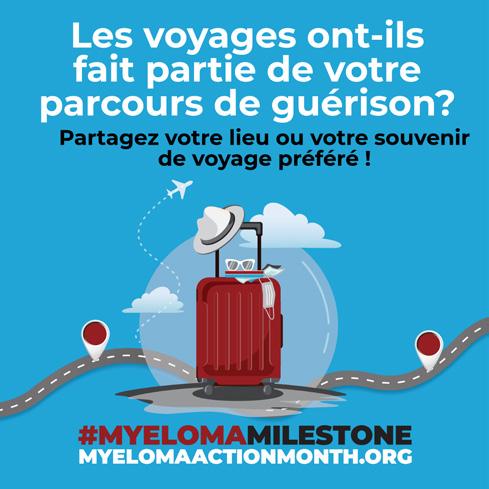
#MyelomaMilestone global campaign
Through the power of personal milestones from those affected by myeloma – a significant treatment breakthrough, overcoming a tough challenge, learning a new skill, or simply enjoying a precious moment with loved ones – the #MyelomaMilestone campaign for Myeloma Action Month raised global awareness about this little-known disease while strengthening ties with members of the global myeloma community.
The #MyelomaMilestone campaign is a celebration of progress, resilience, and hope. Every milestone raises awareness and disseminates information about myeloma. Milestones help drive advocacy efforts and encourage policymakers to prioritize myeloma research, improve patient access to care, and ensure equitable treatment options for all. Additionally, as myeloma awareness grows, so does the momentum in myeloma research that brings us ever-closer to a cure.
A milestone year for the IMF
#MyelomaMilestone is an apt and timely theme for the IMF. In October 2025, the IMF will celebrate our 35th anniversary, a major milestone! The support of the global myeloma community

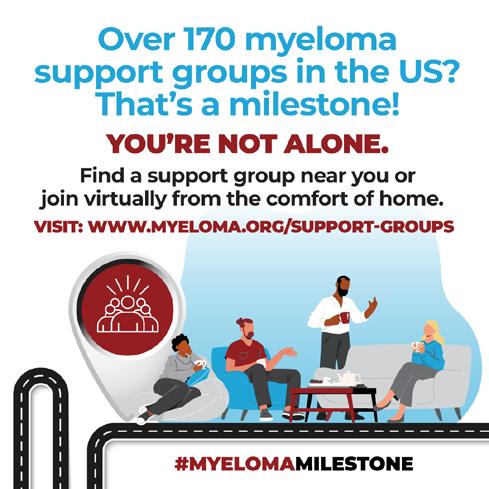
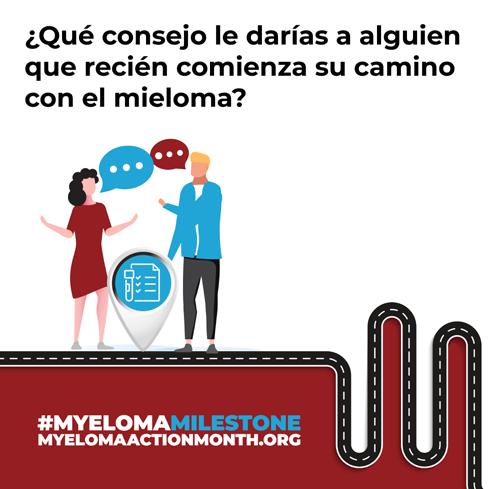

has made these 35 years possible. Together, we’ve championed patients and care partners, educated healthcare professionals, and funded groundbreaking myeloma research. As we look to an even brighter future, we honor the past, celebrate the present, and continue to defy boundaries and redefine possibilities. The IMF vision is that of a world where every myeloma patient can live life to the fullest, unburdened by the disease.
To further enhance the effect of the #MyelomaMilestone global campaign, the IMF hosted three Facebook LIVE “Ask Me Anything About Myeloma” Q&A events to inform the myeloma community about the latest in myeloma research, clinical therapies, disparities in healthcare, benefits of good nutrition, and more. Turn to page 2 of this edition of Myeloma Today and use the QR codes to view the video replays.
On March 14–15, the IMF held its annual Patient & Family Seminar (PFS) in Boca Raton, FL. One of the highlights was a “Fireside Chat” with Dr. Joseph Mikhael (IMF Chief Medical Officer) and Dr. Rafat Abonour (Indiana University – Indianapolis, IN) on What is the
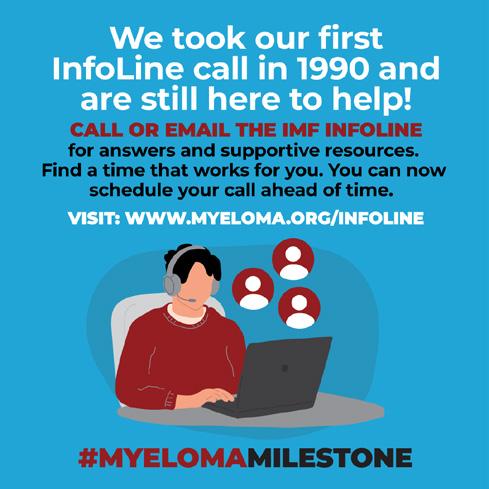

Future of Myeloma? Turn to page 4 of this edition of Myeloma Today to read more about it.
On March 15 in Boca Raton, Florida, the IMF launched the Miracles for Myeloma 5K Run/Walk, the first in a series of such events to be held across the U.S. to raise myeloma awareness and to accelerate our efforts to find a cure. “The Boca Raton Miracles for Myeloma 5K Run/Walk was nothing short of extraordinary,” said Sylvia Dsouza (IMF Vice President, Development). “Patients, care partners, families, clinicians, and advocates came together to advance the IMF’s mission. We extend our warmest thanks to the community for supporting the IMF during Myeloma Action Month.”
During the 2025 Myeloma Action Month, the global myeloma community celebrated #MyelomaMilestones, raised myeloma awareness, and embraced each other’s achievements. The IMF is grateful to our sponsors for their support of the 2025 Myeloma Action Month: Amgen, Binding Site, Bristol Myers Squibb, GSK , Johnson & Johnson, Karyopharm Therapeutics, Kite Arcellx, Pfizer Inc., Regeneron, and Sanofi MT

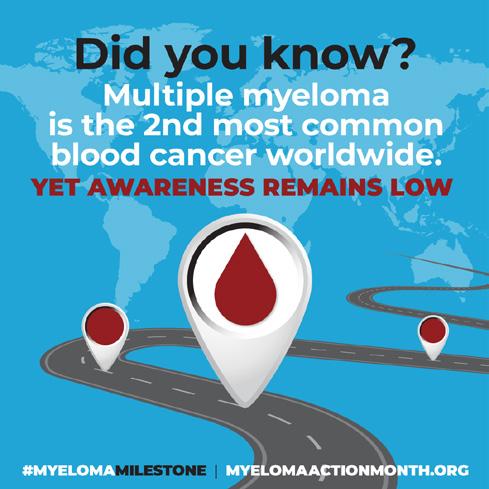

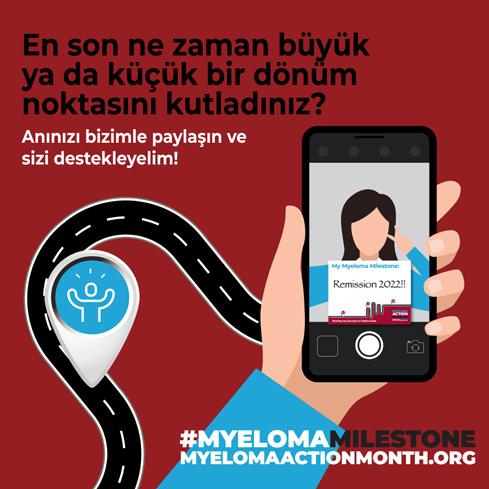
By Danielle Doheny IMF Director, Public Policy & Advocacy
In March 2025, five graduates of the International Myeloma Foundation (IMF) Legislative Advocacy Master Class (LAMC), in partnership with Patients Rising, traveled to Capitol Hill to share their personal stories on behalf of the myeloma community. Their goal was to raise awareness about the urgent need for increased cancer research funding, improved access to care, and more affordable treatment options.
Over the span of two days, IMF myeloma advocates met with nearly 30 members of Congress, discussing key policy issues and stressing the importance of bipartisan action. Each of the IMF advocates brought a unique perspective to the conversations.
Michael Riotto (IMF Grassroots Advocacy Leader): Michael’s strategic relationships were instrumental in preparing the group of IMF advocates for their Congressional meetings.
Tony Newberne (North Carolina): A seasoned IMF advocate with strong ties to the Congressional Black Caucus and his state’s delegation, Tony is a leader in advancing myeloma-related policy priorities.
Lisa Hatfield (Idaho): A first-time advocate, Lisa explained how telehealth plays a key role in improving access to care.
Aurlisa (Lisa) Isom (Louisiana): A first-time advocate, Lisa used her personal story to effectively highlight the daily challenges faced by patients with myeloma.
Bryan Soronson (Maryland): A first-time advocate, Bryan has expertise in National Institutes of Health (NIH) funding, federal investment in cancer research, as well as extensive knowledge about managing clinical trials.
The IMF advocates met with lawmakers to discuss these priorities.
Funding for the NIH, CDC, FDA, and ARPA-H: Past investments have led to groundbreaking treatments that improve outcomes for myeloma patients.
Telehealth: The extension of telehealth provisions would enable myeloma patients to receive essential care remotely, especially in rural and underserved areas.
Drug affordability and Pharmacy Benefit Managers (PBM) reform: PBM reform would reduce the rising prescription costs. There is a bipartisan interest to address this.
Lawmakers were receptive to the requests from IMF advocates and expressed support for maintaining and potentially increasing cancer research funding in the fiscal year (FY) 2026 budget. However, decisions regarding telehealth extensions and PBM reform will depend on future legislative actions.
The IMF’s advocacy day was made possible through participation in the One Voice Against Cancer (OVAC) coalition led by the American Cancer Society Cancer Action Network (ACSCAN). OVAC provided invaluable training and logistical support for IMF advocates who joined forces with others in the cancer community to amplify the message of myeloma patients while working toward shared goals, underscoring the collective commitment to improving outcomes for all cancer patients.
Each member of the IMF advocacy team expressed their appreciation for the opportunity to influence policy on Capitol Hill. As Lisa Isom put it, “I cannot wait to do it again.” Our special thanks to Tony Newberne for his mentorship of the IMF team and to Michael Riotto for his leadership; both were essential to the success of this advocacy push. The IMF recognizes the power of grassroots advocacy to drive policy changes that benefit patients with myeloma, and we invite you to join us by emailing advocacy@myeloma.org MT
Visit advocacy.myeloma.org to learn more about our activities and subscribe to the IMF Advocacy Newsletter at subscribe.myeloma.org
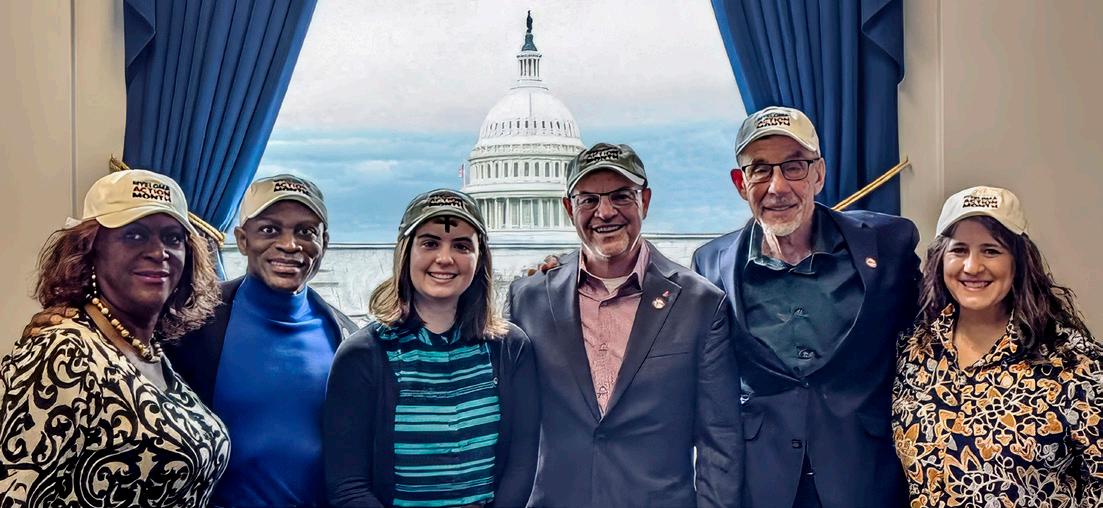

is celebrating 35 years!
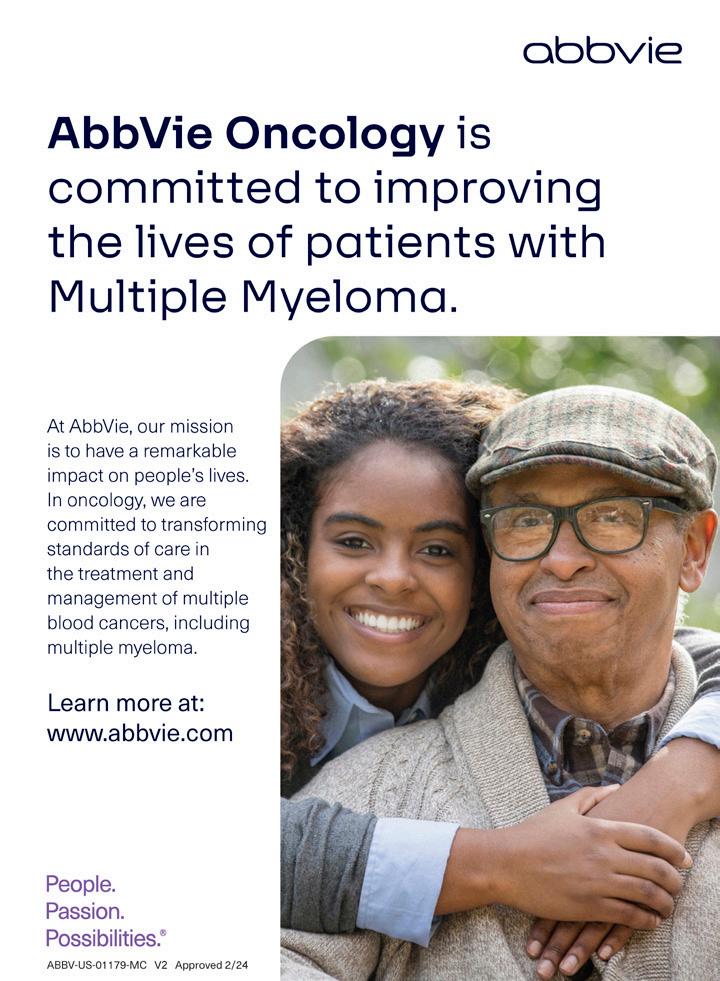


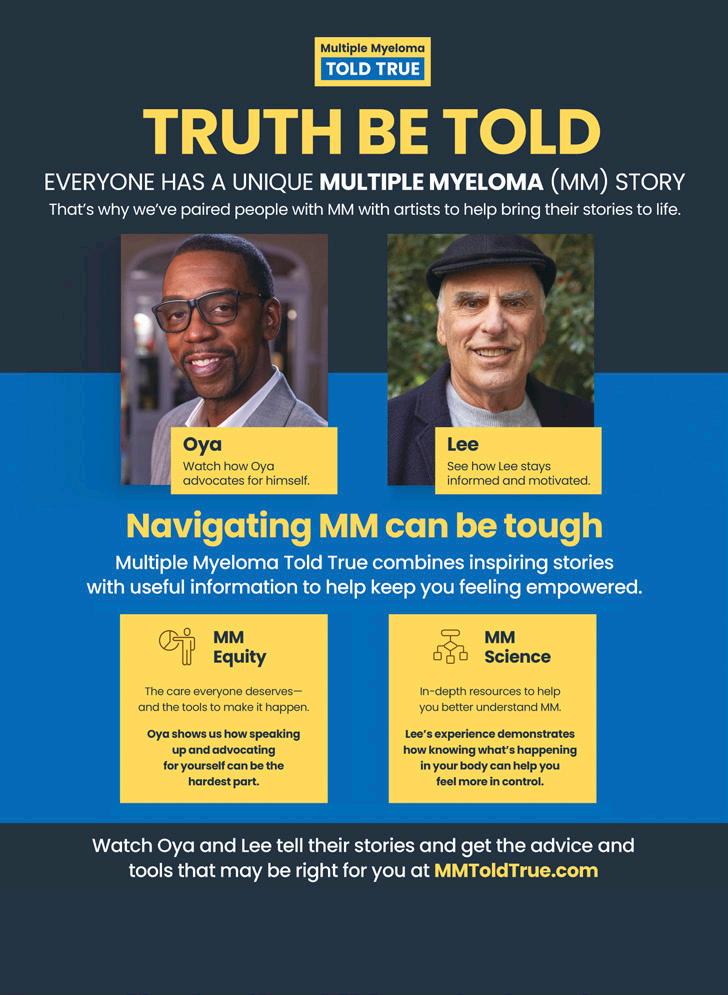


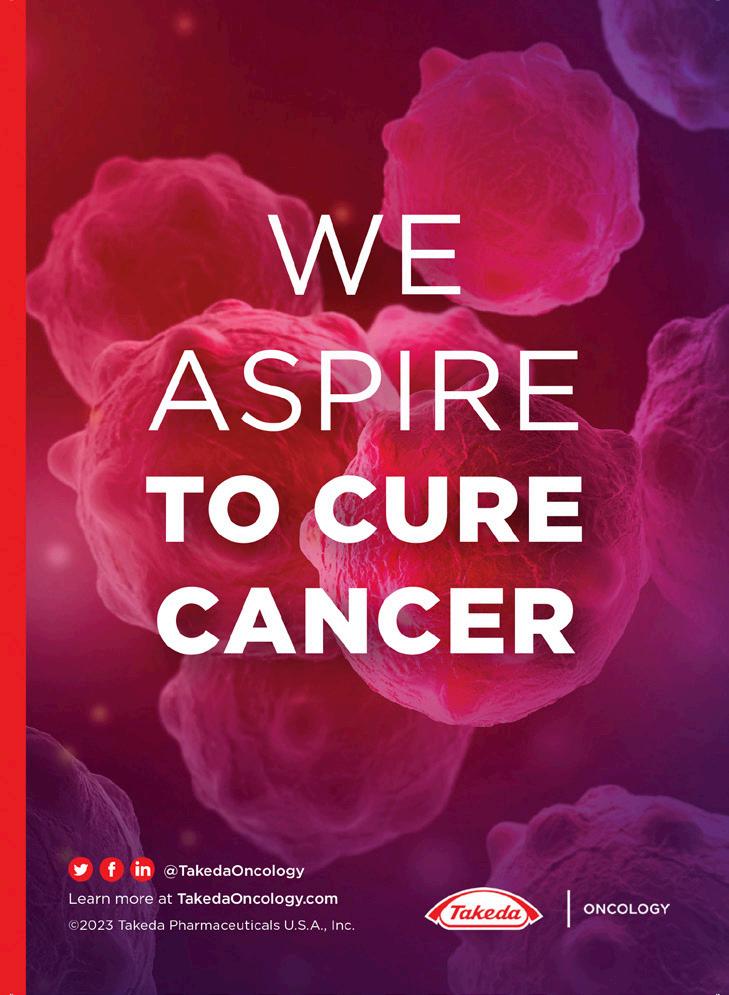

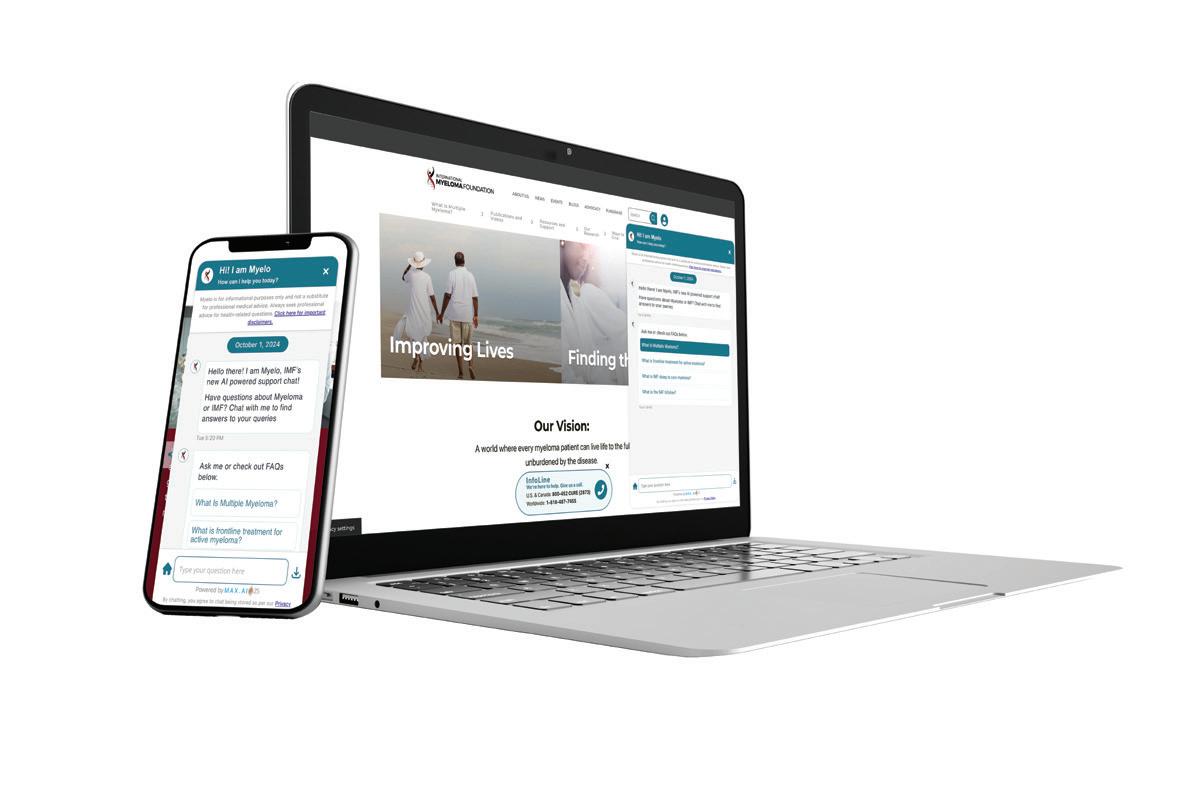
grupo de apoyo voluntario para pacientes interesados, se anima a los cuidadores, familiares y amigos a unirse a nosotros. Se trata de una excelente manera de conocer e interactuar con otros supervivientes y cuidadores para conocer los últimos avances en el tratamiento y la gestión del mieloma. Para más información: lasvoces@imfsupport.org lasvoces.support.myeloma.org
Founders
Brian D. Novis • Susie Durie • Brian G.M. Durie, MD
Board of Directors
Chairperson S. Vincent Rajkumar, MD
Christine Battistini
Loraine Alterman Boyle
Martine Elias, MSc
George T. Hayum
The IMF Regional Community Workshop (RCW) program is a condensed version of the IMF Patient & Family Seminar (PFS) program. RCW meetings are designed for members of the myeloma community who prefer to receive support and information in a smaller setting. RCW presentations cover the following topics:
An overview of myeloma,
Management of myeloma symptoms,
Treatment of newly diagnosed myeloma,
Management of treatment side effects,
Maintenance therapy,
Treatment of relapsed or refractory disease,
An update on myeloma clinical trials,
Each RCW will connect you with a local myeloma specialist as well as with a member of the IMF Nurse Leadership Board (NLB). In addition, each presentation is followed by a Q&A session that gives ample time to interact with faculty.
Edina, MN
Regional Community Workshop
April 26, 2025
The Westin Edina Galleria 3201 Galleria – Edina, MN 55435
Denver, CO
Regional Community Workshop
June 21, 2025
Please use the QR code closer to the event date to confirm location and to register. These exciting and educational workshops are FREE but seating is


Jason Katz
Benson Klein, JD
Andrew Kuzneski, III
Sagar Lonial, MD
Nikhil Munshi, MD
Charles Newman, MS
John O’Dwyer
Kent Oliver
Poornima Parameswaran, PhD
Matthew Robinson, MBA
Sanjay Singh
Maria Whitman, MBA
IMF Executive Team
Diane Moran
Chief Executive Officer
Senior Vice President, Strategic Planning
Peter Anton Vice President, Marketing
Sylvia Dsouza Vice President, Development
Joseph R. Mikhael, MD Chief Medical Officer
IMF Team
Elizabeth Ableson
Administrative Assistant, Human Resources
Betty Arevalo Inventory Control Manager
Becky Bosley Director, Support Groups
Brittnay Brandon Senior Meetings Coordinator
Michelle Carroll Director, Prospect Development
Lisette Contreras Administrative Assistant, Meetings & Events
Danielle Doheny Director, Public Policy & Advocacy
Jon Fitzpatrick Senior Manager, Meetings & Events
Kimberly Francis Assistant Director, Development, Peer-to-Peer Fundraising
Esther Garnica
Administrative Assistant, Operations
Simona Grace Director, Development
Sherrie Guerrero Senior Director, Human Resources
Paul Hewitt Coordinator, InfoLine
Kevin Huynh Coordinator, Tech Solutions
Katie Ives Meeting & Project Coordinator
Marya Kazakova
Senior Director, Editor-in-Chief, Publications
Missy Klepetar Coordinator, InfoLine
Lisa Paik
Executive Vice President, Research & Operations
Jennifer Scarne Chief Financial Officer
Robin Tuohy Vice President, Patient Support
Sapna Kumar
Marketing Strategist
Phil Lange Director, Accounting
Jason London Senior Manager, Marketing & Communications
Marquela Nastri
Grants Specialist
Jim Needham
Publication Design
Meghan O’Connor Meeting & Project Manager, Content & Communications
Selma Plascencia Senior Director, Operations
Joy Riznikove
Database Administrator
Cecilia Romero Project & Technology Manager, Support Groups
Miko Santos Senior Manager, Tech Solutions
Narmeen Shammami Senior Research Project Coordinator
Brando Sordoni
Senior Associate, Accounting & Distribution
Rafi Stephan Senior Administrative Support
Daria Tabota Associate, Marketing & Communications
Joi Tisdale
Project Manager
Jennifer Wieworka Director, Support Groups
Sandy Wilkes
Grants Manager
Yara William Associate Director, Support Groups

Celebrating 35 Years:
International Myeloma Foundation
4400 Coldwater Canyon Avenue, Suite 300
Defying Boundaries, Redefining Possibilities
Studio City, CA 91604 USA
myeloma.org
800.452.CURE
Change Service Requested myeloma.org
Improving the quality of life of myeloma patients while working toward prevention and a cure.
A world where every myeloma patient can live life to the fullest, unburdened by the disease.
If you are inspired by the IMF’s mission and vision, please support our work by using the QR code
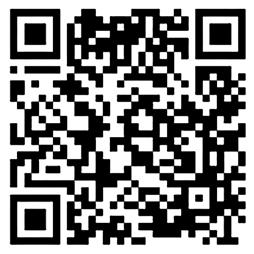
To discuss ways to engage with the IMF, contact Sylvia Dsouza at sdsouza@myeloma.org or 310.947.4126